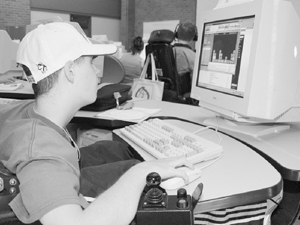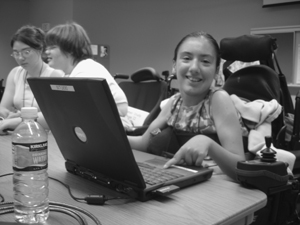DO-IT's E-Mentoring Community
In DO-IT programs, mentor, peer, and near-peer support sometimes occurs in person, but most of the time is delivered through its e-mentoring community. Participants are mentored within a group, and many contributors are included in interactions. Participants also disseminate academic and career-enhancing resources that benefit all community members. Positive aspects of DO-IT's e-community approach include the following:
- Individuals benefit from the experiences of a large group of mentors, peers, and near-peers.
- Mentors can specialize in the areas of their strongest expertise.
- The program performs successfully even though some mentors are less available and skilled than others.
- Using asynchronous, text-based communication on the Internet eliminates barriers faced by other forms of communication that are imposed by location, schedule, and disability.
- The program administrator views all group communications that take place, thus finding it easy to guide and contribute to conversations.
- Mentors learn techniques from each other by attending to the communications that take place.

Most DO-IT Mentors are college students, faculty, engineers, scientists, or other professionals who have disabilities. Protégés are participants in the DO-IT Scholars and DO-IT Pals programs (DO-IT, 2006a,c; Burgstahler, 2007). These students are making plans for postsecondary education and careers. They all have disabilities, including vision, hearing, mobility, and health impairments and specific learning disabilities. Frequent electronic communications and personal contacts bring DO-IT protégés, near-peers, and mentors together to facilitate academic, career, and personal achievements.
Introducing protégés to DO-IT Mentors with similar disabilities is a strength of DO-IT's program. One protégé reported she had never met an adult with a hearing impairment like hers before getting involved in DO-IT: "But when I met him, I was so surprised how he had such a normal life, and he had a family, and he worked with people who had normal hearing. So he made me feel a lot better about my future."
DO-IT's E-Mentoring Participants
DO-IT Scholars
High school students with disabilities who are accepted into the DO-IT Scholars program communicate electronically with Mentors and other DO-IT participants using computers and, if necessary, assistive technology. DO-IT Scholars who do not have the necessary technology are loaned equipment and software. DO-IT Scholars attend summer programs at the University of Washington in Seattle where they participate in academic lectures and labs, live in residence halls, and practice skills that will help them succeed in college and career settings.
DO-IT Ambassadors
When DO-IT Scholars graduate from high school and move on to postsecondary studies, they can become DO-IT Ambassadors, sharing their experiences and advice with DO-IT Scholars and DO-IT Pals and otherwise promoting DO-IT goals.
DO-IT Pals
Teens with disabilities who want to go to college and who have access to the Internet can apply to become DO-IT Pals. DO-IT Pals come from all over the world and use the Internet to explore academic and career interests and communicate with DO-IT Scholars, Ambassadors, and Mentors. To become a DO-IT Pal, a teenager with a disability who already has access to the Internet must send email to doit@u.washington.edu.
DO-IT Mentors
Adult Mentors are an important part of the DO-IT team. DO-IT Mentors are college students, faculty, and professionals in a wide variety of career fields. Many DO-IT Mentors have disabilities themselves. Mentors support DO-IT Scholars, Ambassadors, and Pals as they transition to college, careers, and self-determined lives.
DO-IT Staff
The e-mentoring community administrator monitors discussions, introduces new members to the group, and sends messages with mentoring tips to the mentors and lessons and activities to all members of the community. Other staff join in discussions, particularly during times of low participation by others, and send useful information and resources.
DO-IT e-community participants learn strategies for success in academics and employment. Mentors provide direction and motivation, instill values, promote professionalism, and help protégés develop leadership skills. As one DO-IT Scholar noted, "It feels so nice to know that there are adults with disabilities or who know a lot about disabilities, because I think that people who are about to go to college or start their adult life can learn a lot from mentors . . ." As DO-IT Scholars move from high school to college and careers, they too, as DO-IT Ambassadors, become mentors and role models, sharing their experiences with younger participants.
There are probably as many mentoring styles as there are personality types, and no one can be everything to one person. Each DO-IT participant benefits from contact with many mentors, peers, and near-peers. One-to-one relationships develop naturally as common interests are identified by pairs of mentors, protégés, peers, and near-peers. DO-IT also facilitates communication in small groups through the use of electronic discussion lists. For example, one group includes Mentors, protégés, and near-peers who are blind. Participants in this group discuss common interests and concerns such as independent living, speech and Braille output systems, and options for displaying images and mathematical expressions.
While most communication occurs electronically, some Mentors and near-peers meet DO-IT Scholars during DO-IT Summer Study programs on the University of Washington Seattle campus and at other DO-IT activities across the United States. In-person contact strengthens relationships formed online.
DO-IT has been studying the nature and value of electronic mentoring since 1993. Thousands of electronic mail messages were collected, coded, and analyzed; surveys were distributed to DO-IT Scholars and Mentors, and focus groups were conducted (Burgstahler & Cronheim, 2001).
Findings suggest that computer-mediated communication can be used to initiate and sustain peer-peer and mentor-protégé relationships and alleviate barriers to traditional communications due to time and schedule limitations, physical distances, and disabilities of participants. Both young people and mentors actively communicate on the Inter-net and report positive experiences in using the Internet as a communication tool.
The Internet gives these young people support from peers and adults otherwise difficult to reach, connects them to a rich collection of resources, and provides opportunities to learn and contribute. Participants note benefits over other types of communication. They include the ability to communicate over great distances quickly, easily, conveniently, and inexpensively; the elimination of the barriers of distance and schedule; the ability to communicate with more than one person at one time; and the opportunity to meet people from all over the world. Many report the added value that people treat them equally because they are not immediately aware of their disabilities. Negative aspects of electronic communication include difficulties in clearly expressing ideas and feelings, high volumes of messages, and occasional technical difficulties.

DO-IT's online program has received national recognition with its 1997 Presidential Award for Excellence in Mentoring "for embodying excellence in mentoring underrepresented students and encouraging their significant achievement in science, mathematics, and engineering." It also received the National Information Infrastructure Award in 1995 "for those whose achievements demonstrate what is possible when the powerful forces of human creativity and technologies are combined." Research results suggest the success of the DO-IT electronic community in promoting positive college and career outcomes (e.g., Burgstahler, 1997, 2001, 2002b, 2003a; Burgstahler & Cronheim, 2001; Kim-Rupnow & Burgstahler, 2004). But more importantly, the DO-IT electronic mentoring community has documented its value in the successful lives of its participants and the willingness of those who were once protégés to support young people in the community as they were supported in their youth.
The findings of research on DO-IT's e-mentoring community suggest that peer-peer and mentor-protégé relationships on the Internet perform similar functions in providing participants with psychosocial, academic, and career support. However, each type of relationship has its unique strengths. For example, peer-peer communication includes more personal information than exchanges between mentors and protégés.
Building on the successes of DO-IT and other online mentoring programs, practitioners should consider using the Internet as a vehicle for developing and supporting positive peer and mentor relationships.
Contributions of DO-IT Participants
Everyone in the DO-IT electronic mentoring community benefits from participation. DO-IT Mentors and near-peers in their mentoring role offer protégés
- Information—Mentors share their knowledge and experiences.
- Contacts—Mentors introduce their protégés to valuable academic, career, and personal contacts.
- Challenges—Mentors stimulate curiosity and build confidence by offering new ideas, strategies, and opportunities.
- Support—Mentors encourage growth and achievement by providing an open and supportive environment.
- Direction—Mentors help protégés discover their talents and interests and devise strategies to attain their goals.
- Advice—Mentors make suggestions to help protégés reach academic, career, and personal goals.
- Role Modeling—Mentors let protégés know who they are and how they have reached their goals.
DO-IT protégés offer Mentors
- Challenge—Mentors develop their own personal styles for sharing their skills and knowledge via electronic communication.
- Opportunities to Help Set Goals—Mentors encourage DO-IT participants to listen to their hearts and think about what they really want to do.
- A Chance to Share Strategies—Mentors pass on hard-earned experiences.
- New Ideas—Mentors join an active community of talented students and professionals with a wide range of disabilities who are eager to share their own strategies for problem solving and success.
- Fun—Mentors share in the lives of motivated young people, listening to them, hearing about their dreams, helping them along the road to success—it's fun!